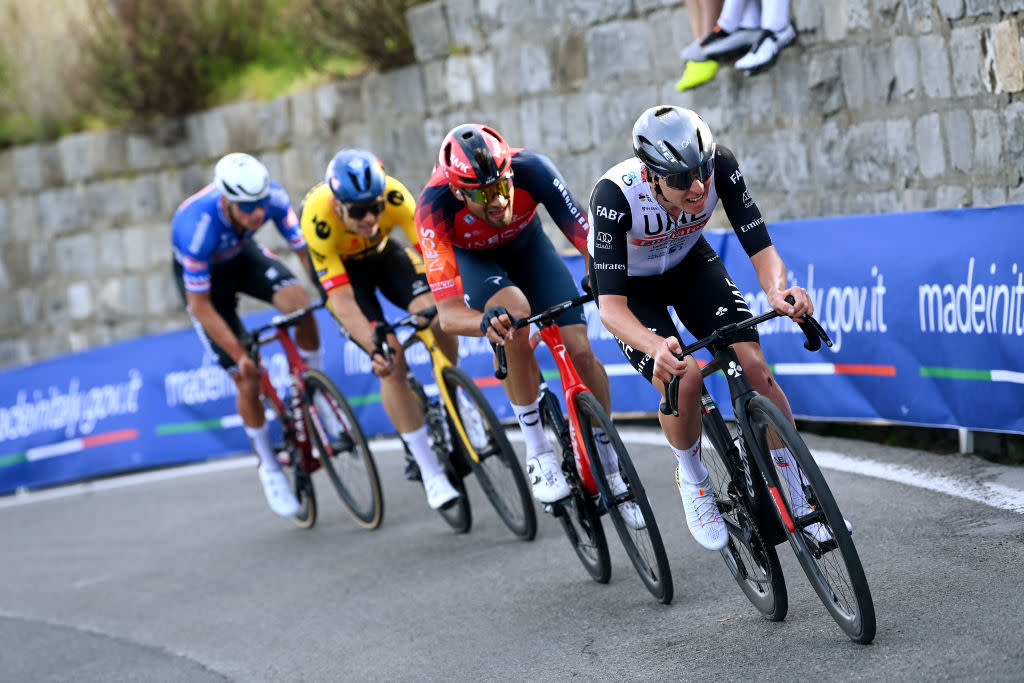Milan-San Remo: Mathieu van der Poel smashes 1995 Poggio climbing record

- Oops!Something went wrong.Please try again later.
- Oops!Something went wrong.Please try again later.
- Oops!Something went wrong.Please try again later.
The 2023 Milan-San Remo was the second fastest edition on record for the 116-year-old Italian Monument, thanks to strong tailwinds on the Ligurian coast of the Mediterranean.
A combination of those winds, good legs and motivation propelled Mathieu van der Poel into the record books, with the Alpecin-Deceuninck rider setting a new fastest time for the climb of the Poggio.
His solo attack across the top of the final climb catapulted him to a solo victory on Via Roma.
Van der Poel blasted his way up the 3.7km Poggio in 5 minutes, 40 seconds according to data experts who analysed the race via video footage.
That was three seconds faster than the 5:43 set by Tadej Pogačar, Filippo Ganna and Wout van Aert, and a further three seconds faster the previous record of Maurizio Fondriest and Laurent Jalabert of 1995. Other sources have slightly different times but Van der Poel was on record breaking form.
Read more
Milan-San Remo: Mathieu van der Poel ignites Poggio descent for solo victory
Mathieu van der Poel makes Milan-San Remo history 62 years after his grandfather
Milan-San Remo 2023 - How Van der Poel claimed his third Monument
Ganna would finish second on the day, and Van Aert third.
“I think Milan-San Remo is maybe the only Monument where you can have a top five like this with stage racers like Pogačar, a world time trial champion and Hour Record holder like Ganna and of course Wout van Aert. So many riders can win it but only one does,” Van der Poel said.
Once across the finish line with the victory in hand, Van der Poel also etched his name in the long history of Milan-San Remo as the first Dutchman to win in 38 years. He also followed the wheeltracks of his grandfather, French cycling great Raymond Poulidor, who won the same Monument 62 years ago.
“It’s a unique race because it's a really difficult race to win. You don't always win if you're the strongest, so that makes it really special when you do. Not a lot of riders have won solo, so I'm proud of my performance,” Van der Poel said after winning Milan-San Remo in his fourth attempt. He was third last year and fifth in 2021.
Van der Poel averaged 39.18 kph on the climb of the Poggio, and according to La Gazzetta dello Sport he had an estimated average power output of 564 watts, or 7.5 watts/kg.
The Poggio measures just 3.7km in length and averages a mere 3.6% on its twisting slopes, but the severity hits riders in the closing stretch of one of the longest one-day races on the calendar and after nearly seven hours in the saddle. The Poggio was added in 1960 as the final climb of Milan-San Remo, giving the race its current flavour and creating a perennial battle between the attackers and the sprinters.
Overall, Van der Poel notched the second fastest overall race speed on record, with an average speed of 45.773 kph. The fastest recorded time remains with Gianni Bugno, who averaged 45.806 kph in 1990.

